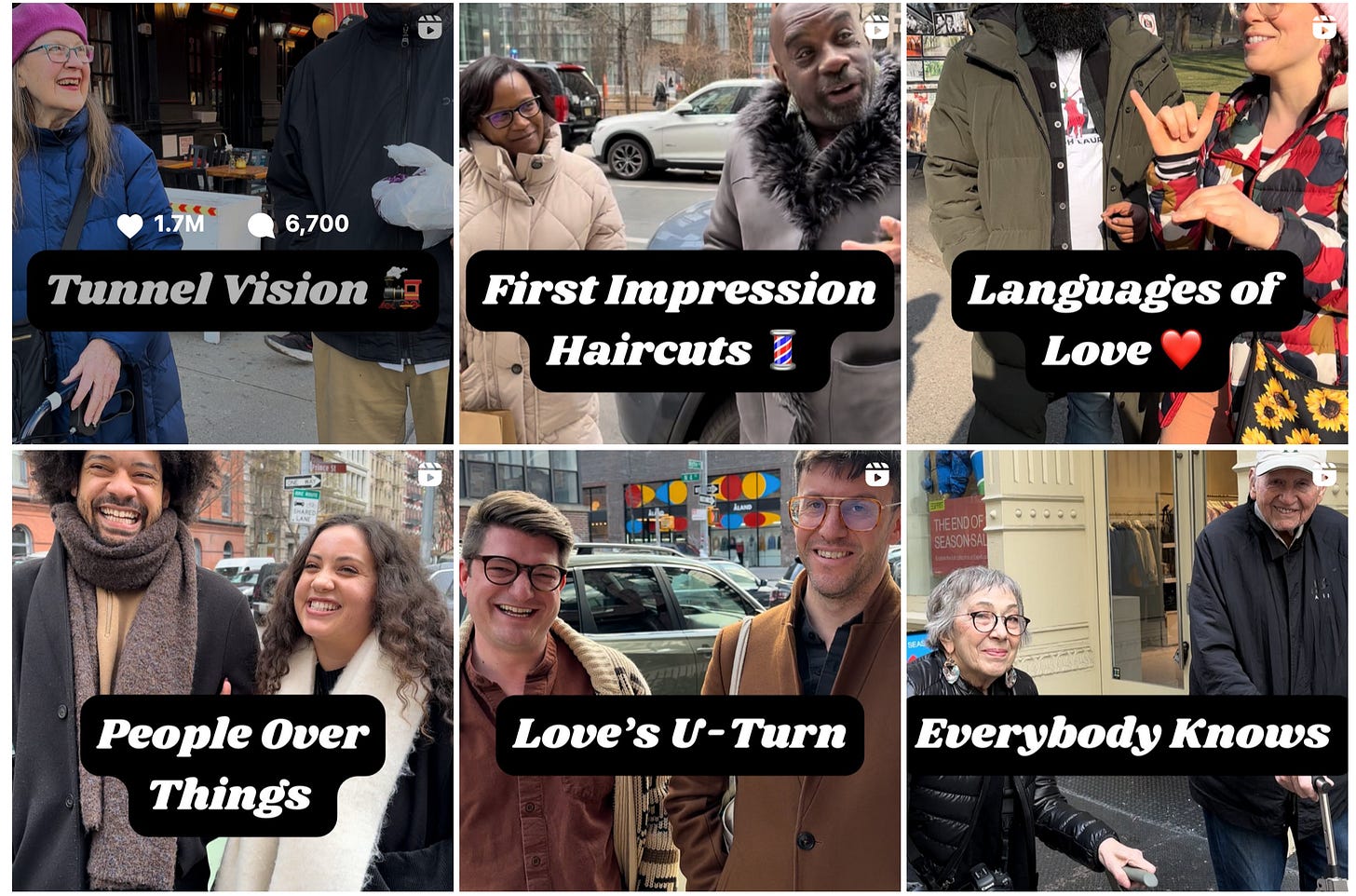Tiny Digital Love Stories
How MeetCutesNYC reimagines the Internet
Discussed: MeetCutesNYC, the Internet, empathy, Roger Ebert, films, TV shows, online videos
I never go on social media expecting to be moved to tears, but that’s exactly what happened when I first encountered MeetCutesNYC, a documentary series that features short clips of couples being interviewed about how they fell in love. The wildly popular series is mostly shot in New York, though the series occasionally branches out to other locations. Each video focuses on a single couple the host interviews with a series of gentle questions: Are you two a couple? How long have you been together? What do you like most about each other? What advice would you give another couple who just started dating?
Their verbal answers are moving, though you often glean more about a couple by simply watching their gaze. When the interviewer first approaches, most couples are cautious about talking to a stranger and one of the pleasures of the series is watching people let their guard down as they joyfully remember how they met the love of their life. The closest couples always turn towards each other, rather than the interviewer. Their partners echo and correct their tales, adding nuance and perspective. When the interviewer asks what they love most about each other, the couples often get visibly overwhelmed. They struggle for specificity and end up relying on extremely broad generalizations. “Everything,” one man says, as he lovingly looks at his partner, “Isn’t that the right answer?”
The couples come in all ages, races, genders, religious and cultural backgrounds. Some are funny, taking playful jabs at one another. Others are almost painfully earnest. Though viewers sometimes drop notes in the comments complaining about not liking a particular couple or criticizing an answer, (“He said he appreciated her hand work? How unromantic!”) more often, the people who come to watch MeetCutesNYC simply leave compliments. They gush over individual couples they adore. They thank the couples, especially the older ones, for their wisdom. Commenters who have yet to find the love of their life reflect on their hope for similar kinds of relationships. Sometimes the children of the people being interviewed chime in, “These are my parents,” they say, “They are just as wonderful in real life!”
A more cynical viewer might argue that MeetCutesNYC is schmaltzy. And it’s true that a 45-second clip doesn’t have the same exact power as a two-hour film. But, for me, the little love stories are more than a welcome break from doomscrolling. They are an urgent reminder that digital spaces can be an opportunity to engage the world with greater empathy, the same way Roger Ebert argued that the best movies can:
We are all born with a certain package. We are who we are. Where we were born, who we were born as, how we were raised. We are kind of stuck inside that person, and the purpose of civilization and growth is to be able to reach out and empathize a little bit with other people, find out what makes them tick, what they care about. For me, the movies are like a machine that generates empathy. If it’s a great movie, it lets you understand a little bit more about what it’s like to be a different gender, a different race, a different age, a different economic class, a different nationality, a different profession, different hopes, aspirations, dreams and fears. It helps us to identify with the people who are sharing this journey with us. And that, to me, is the most noble thing that good movies can do and it’s a reason to encourage them and to support them and to go to them.
If film has the potential to make our world bigger, as Ebert suggests, you could argue that the experience of scrolling online feels like the opposite. We tend to seek out content that aligns with beliefs we already have, and, even if we don’t, various algorithms will usher us towards content that connects to what we’ve already watched or read.
The longer we scroll, the harder it is to get outside of ourselves and the result is our world often feels smaller with every click. I’ve been captivated with the idea that long form media encourages greater empathy precisely because it requires that we spend more time with it. And yet, I think that MeetCutesNYC, which has a viewership of over two million, demonstrates the potential power of the short form video as a new kind of “empathy machine,” as Ebert would call it. A two-hour long film can be a beautiful way to encourage curiosity about the world outside of ourselves, but so can a one-minute love story.





